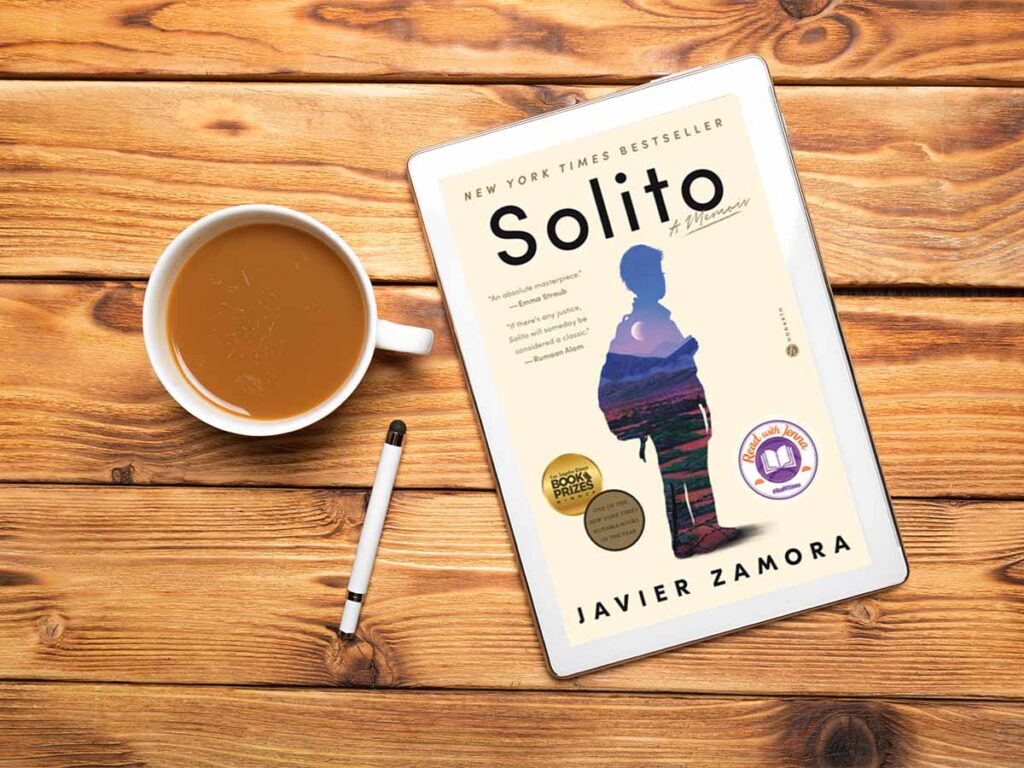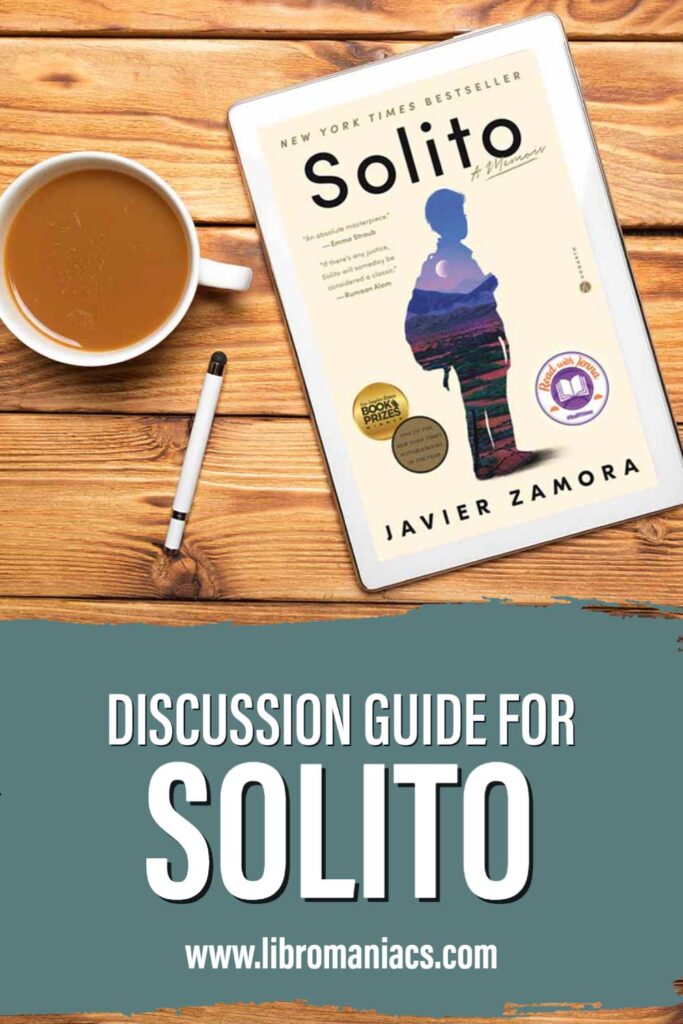Solito offers a unique and important glimpse into the immigrant experience, and is perfect for book clubs who aren’t afraid of discussing challenging and emotional themes, and real world events. This memoir is the story of young Javier Zamora, who at only 9 years old migrated from El Salvador to the US. He did so in order to reunite with his parents, leaving behind the rest of his family, his school, and the only life he knows.
Readers are challenged to put themselves in Javier’s shoes as he faces tremendous physical, mental, and emotional obstacles on his journey through Central America, Mexico, and the Sonoran Desert. Our Solito book club questions will guide you through important discussion points, and allow reflection on some of the powerful themes in this memoir.
This Solito discussion guide contains discussion prompts, a synopsis and several reader reviews to help your book group unpack and discuss your reading experience. And if you enjoyed Solito, we’ve also included suggestions for your next read that are similar in themes or tone.

(This article contains affiliate links. This means that if you choose to purchase, I’ll make a small commission.)
Solito Synopsis
(We always chose to provide the publisher synopsis because we feel that it’s worthwhile to discuss whether the official book description actually squared with your experience of the book.)
Solito, Javier Zamora
Trip. My parents started using that word about a year ago—“one day, you’ll take a trip to be with us. Like an adventure.”
Javier Zamora’s adventure is a three-thousand-mile journey from his small town in El Salvador, through Guatemala and Mexico, and across the U.S. border. He will leave behind his beloved aunt and grandparents to reunite with a mother who left four years ago and a father he barely remembers. Traveling alone amid a group of strangers and a “coyote” hired to lead them to safety, Javier expects his trip to last two short weeks.
At nine years old, all Javier can imagine is rushing into his parents’ arms, snuggling in bed between them, and living under the same roof again. He cannot foresee the perilous boat trips, relentless desert treks, pointed guns, arrests and deceptions that await him; nor can he know that those two weeks will expand into two life-altering months alongside fellow migrants who will come to encircle him like an unexpected family.
A memoir as gripping as it is moving, Solito provides an immediate and intimate account not only of a treacherous and near-impossible journey, but also of the miraculous kindness and love delivered at the most unexpected moments. Solito is Javier Zamora’s story, but it’s also the story of millions of others who had no choice but to leave home.
10 Solito Book Club Questions
- Did any part of Javier’s story surprise you? What did you learn about the migrant experience through this memoir? Did his story change any of your opinions on the topic of immigration?
- What emotions did you experience while reading Solito? Discuss some of the moments that elicited those emotions, both high and low.
- Javier was only 9 years old when he migrated from El Salvador. How do you think his age impacted his experience, his perception of events, and how he coped with his situation?
- How did Javier’s perspective of his relationship with his grandfather change after they experienced part of his migration journey together? Have you ever experienced an event that changed your relationship with a friend or family member?
- Discuss the evolution of Javier’s relationship with Patricia, Carla, and Chino. Why do you think these four in particular were able to forge such a strong connection?
- Javier reveals that he did not stay in touch with Patricia, Carla, or Chino after they arrived in the United States. Did this surprise you? Why do you think The Four did not maintain a relationship?
- Throughout the memoir, the author describes the environment (such as the weather, the terrain, the plant life, etc.) in great detail. Why do you think the author conveyed these details? How did they contribute to the story?
- Though Javier was caught on his first two attempts to make it to the United States, the results of these experiences were very different. How did each of these experiences impact him?
- Why do you think the author chose not to provide much reflection on his experience from his adult perspective, or much context on the topic of migration outside of his own journey?
- “It’s because our parents are not here and we’re not there that May’s and June’s are sad.”
Javier’s parents left El Salvadore due to the ongoing civil war there. Discuss the types of factors you think parents must weigh when deciding to migrate without their children. What type of long term impact do you think this has on the families of migrants? - BONUS QUESTION: In July of 2023, Zamora wrote an opinion piece criticizing the practice of many literary awards (including the Pulitzer) to only consider submissions by American citizens. Zamora has lived in the US for 17 years, on a variety of different visas, but he’s not a citizen. Ironically, even though he’s not eligible for a Pulitzer, they actually asked him participate in the judging.
Give the opinion piece a read and discuss whether you think he makes a good argument for changing the eligibility practices.
Selected Reviews for Solito
(Use these selected Goodreads reviews to compare with your own experience of the book. Do you agree or disagree with the reviews?)
“As a mom, I couldn’t imagine my much older boys doing what Javier did, and it really tore me up reading about the more harrowing, downright painful parts of his migration (and there were many). There were times when I got angry and frustrated at the adults who put this little boy through this unbelievable experience. What made this memoir so special is not just what happened or even the beautiful language this acclaimed poet uses to tell us the story, but the amazing way he faced the hardships–with humor, childlike innocence, faith, courage, gratitude, tenacity, and above all, hope. Hope in the goodness of other people, hope in himself to make it through, and hope that he will reach his parents. This is a beautiful, special book.”
“I feel terrible giving this three stars — the details of the story are dramatic and emotionally gripping, and he writes (and reads) very poetically. Solito’s rhythm is that of a child, and you very much feel how long they are walking, how tired they are, how bored. But overall, this didn’t do much for me. I found it too long and repetitive, and because it is told through the eyes of a 9 year old, there’s no reflection on other people who make the trip with them or any context/commentary on immigration trends overall, which I would’ve liked.”
“I think what you have to keep reminding yourself is that Javier Zamora was nine years old at the time of his crossing. When he is afraid of getting undressed or peeing in public you have to keep remembering that this is a small boy, alone, amongst a lot of frightened adults without any parent to guide him… There are times when the tale is repetitive but crossing a desert by foot, I imagine, is extremely repetitive. However, Javier Zamora’s memoir is shocking to say the least. Unscrupulous coyotes, lack of food/water/shade/sleep all play their part. It certainly makes you realize how afraid and desperate people have to be to undertake this journey.”
3 Books like Solito
Solito is really great on audio. If you like audio, we have a whole list of audiobook memoirs that are read by the author. If you are keen for more immigrant stories check out these discussion guides: How Not to Drown in a Glass of Water, A Woman is No Man, or Americanah.

Unforgetting, Roberto Lovato
(Subtitle: A Memoir of Family, Migration, Gangs, and Revolution in the Americas)
This memoir is perfect for reader’s who are interested in learning more about the complex history of El Salvador, the impact of this history on its people, and the continued impact on the communities of Salvadorans living in the United States. Lovato, the son of migrants, weaves his own personal story with that of his family for a multi-generational perspective as he returns to El Salvador during the Civil War.

Children of the Land, Marcelo Hernandez Castillo
This memoir focuses on life as an undocumented person living in the United States. The author, originally from Mexico, describes their interaction with the US immigration system, the everyday anxieties he experienced as an undocumented person, and the juxtaposition of seeking a better life in a country that simultaneously presents its own dangers and challenges to immigrants.

American Dirt, Jeanine Cummings
American Dirt is a fictional story that covers similar ground as Solito. It’s been a very popular book club book, but it’s not an owned voices novel. So, it may be interested to read as a follow-up to Solito and compare how they each present the immigrant experience.
The novel follows a woman and her son migrating to the United States from Mexico to escape the target of a violent drug cartel.
Have a listen on Audible. Try audio books for free for 30 days.
Share these Solito book club questions with your friends:

